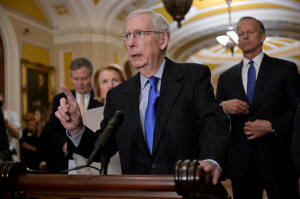US Senate Republicans push back against anti 'judge shopping' policy
 Send a link to a friend
Send a link to a friend
 [March 15, 2024]
By Nate Raymond [March 15, 2024]
By Nate Raymond
(Reuters) -U.S. Senate Republicans on Thursday pushed the federal
judiciary to rethink a new policy designed to curb the practice of
"judge shopping" used by conservative litigants to steer cases
challenging President Joe Biden's agenda to judges perceived as
sympathetic.
Senate Minority Leader Mitch McConnell on the Senate floor said he hoped
the U.S. Judicial Conference, the judiciary's policymaking body, would
reconsider the "half-baked" policy it adopted on Tuesday designed to
ensure that cases challenging federal and state laws are randomly
assigned judges.
McConnell called it an "unforced error" by the 26-member Judicial
Conference, which he said "took the bait" from Democrats who complained
about lawsuits by conservative litigants in single-judge courthouses, or
divisions, in Texas with Republican-appointed judges.
The Judicial Conference is presided over by conservative Chief U.S.
Supreme Court Justice John Roberts.
Under the new policy, lawsuits seeking to block federal or state laws
would not remain in such a single-judge division but instead be assigned
a judge randomly throughout a larger federal district.
"This will have no practical effect in the venues favored by liberal
activists, but Democrats are still salivating at the possibility of
shutting down access to justice in the venues favored by conservatives,"
McConnell said.

In letters sent to several chief judges of district courts affected by
the policy, McConnell, of Kentucky, and Republican Senators John Cornyn
of Texas and Thom Tillis of North Carolina urged them to continue their
existing practices, citing a statute they said gave the local courts
sole discretion to decide how cases are assigned.
The Administrative Office of the U.S. Courts, the judiciary's
administrative arm, did not respond to a request for comment.
Republican state attorneys general and activists had seized on local
rules in Texas to sue in small courthouses in the state whose one or two
judges were appointed by Republican presidents, enabling them to
essentially choose judges who have reliably ruled in their favor on
issues like abortion, immigration and gun control.
In one of those cases, U.S. District Judge Matthew Kacsmaryk - an
appointee of Republican former President Donald Trump - in the
single-judge division of Amarillo, Texas, in April suspended approval of
the abortion pill mifepristone.
The U.S. Supreme Court has allowed the pill to remain on the market
while it considers an appeal in the case, set for argument on March 26.
[to top of second column]
|

Senate Minority Leader Mitch McConnell (R-KY) speaks during a press
conference following the weekly Senate caucus luncheons on Capitol
Hill in Washington, U.S., March 12, 2024. REUTERS/Craig Hudson/File
Photo

The Texas cases prompted calls from Democratic lawmakers, the Biden
administration, the American Bar Association and others for the
judiciary to ensure cases challenging national policies are heard by
a random judge.
Judicial policymakers in announcing the new policy said it promotes
public confidence in the courts by ensuring a litigant cannot
pre-select a judge by filing in a one-judge division.
The chair of the Judicial Conference's executive committee,
conservative U.S. Circuit Judge Jeffrey Sutton, on Tuesday called
the policy a "good idea."
But some conservative judges have criticized the policy change, and
McConnell on Thursday said it did not address the real issue, which
he said is increasing instances of a single judge issuing
injunctions blocking federal policies nationwide, rather than just
the judge's own jurisdiction.
That occurred frequently during Trump's administration in cases that
Democratic state attorneys general and others filed in venues like
California's Northern District, but those courthouses have multiple
judges who could be randomly assigned cases.
McConnell said rather than working with Republicans to "eliminate a
practice that gores the oxen of both parties," Democrats convinced
the Judicial Conference to adopt a policy that will "just restrict
the access to conservative judges."
McConnell will leave his leadership position following the November
elections, in which Republicans hope to retake control of the
Senate. In Thursday's speech, he did not call for legislation to
reverse the Judicial Conference's policy.
But he warned that "if Republicans see a federal judiciary that is
using its procedural independence to wade into political disputes,
any incentive we may have to defend that procedural independence
will vanish, as well."
(Reporting by Nate Raymond in Boston; Editing by Bill Berkrot,
Alexia Garamfalvi and Leslie Adler)
[© 2024 Thomson Reuters. All rights reserved.]This material
may not be published, broadcast, rewritten or redistributed.
Thompson Reuters is solely responsible for this content.
 |